Sanoopkumar P. S.
Time and Frequency Synchronization for Multiuser OTFS in Uplink
Jul 23, 2025Abstract:In this paper, we propose time and frequency synchronization techniques for uplink multiuser OTFS (MU-OTFS) systems in high-mobility scenarios. This work focuses on accurately estimating and correcting timing offsets (TOs) and carrier frequency offsets (CFOs). Specifically, TO estimation is essential for locating users' pilots on the delay-time plane, while CFO estimation enhances channel estimation accuracy. First, we propose a TO estimation technique for an existing multiuser pilot structure in MU-OTFS. We replace the impulse pilot (IMP) in this pilot structure with a more practical pilot with a cyclic prefix (PCP), referred to as single-user-inspired PCP (SU-PCP). This structure employs different Zadoff-Chu (ZC) sequences, which enables pilot separation via correlation at the receiver side. Consequently, we introduce a correlation-based TO estimation technique for uplink MU-OTFS using this pilot structure. Next, a spectrally efficient and practical pilot pattern is proposed, where each user transmits a PCP within a shared pilot region on the delay-Doppler plane, referred to as MU-PCP. At the receiver, the second TO estimation technique utilizes a bank of filters to separate different users' signals and accurately estimate their TOs. Then, we derive a mathematical threshold range to enhance TO estimation accuracy by finding the first major peak in the correlation function rather than relying solely on the highest peak. After locating the received users' pilot signals using one of the proposed TO estimation techniques, our proposed CFO estimation technique reduces the multi-dimensional maximum likelihood (ML) search problem into multiple one-dimensional search problems. In this technique, we apply the Chebyshev polynomials of the first kind basis expansion model (CPF-BEM) to effectively handle the time-variations of the channel in obtaining the CFO estimates for all the users.
PAPR of DFT-s-OTFS with Pulse Shaping
Jul 16, 2025Abstract:Orthogonal Time Frequency Space (OTFS) suffers from high peak-to-average power ratio (PAPR) when the number of Doppler bins is large. To address this issue, a discrete Fourier transform spread OTFS (DFT-s-OTFS) scheme is employed by applying DFT spreading across the Doppler dimension. This paper presents a thorough PAPR analysis of DFT-s-OTFS in the uplink scenario using different pulse shaping filters and resource allocation strategies. Specifically, we derive a PAPR upper bound of DFT-s-OTFS with interleaved and block Doppler resource allocation schemes. Our analysis reveals that DFT-s-OTFS with interleaved allocation yields a lower PAPR than that of block allocation. Furthermore, we show that interleaved allocation produces a periodic time-domain signal composed of repeated quadrature amplitude modulated (QAM) symbols which simplifies the transmitter design. Based on our analytical results, the root raised cosine (RRC) pulse generally results in a higher maximum PAPR compared to the rectangular pulse. Simulation results confirm the validity of the derived PAPR upper bounds. Furthermore, we also demonstrate through BER simulation analysis that the DFT-s-OTFS gives the same performance as OTFS without DFT spreading.
Reduced Overhead Channel Estimation for OTFS With Split Pilot
Oct 15, 2024
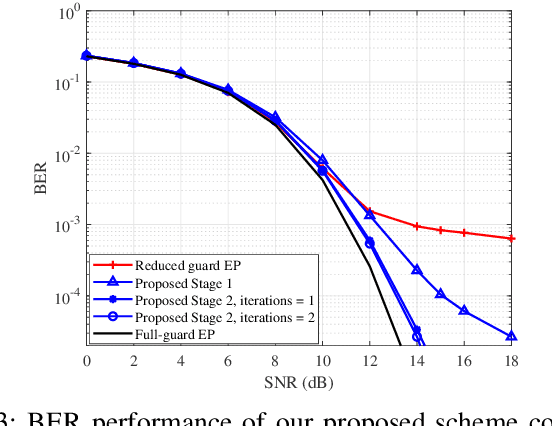
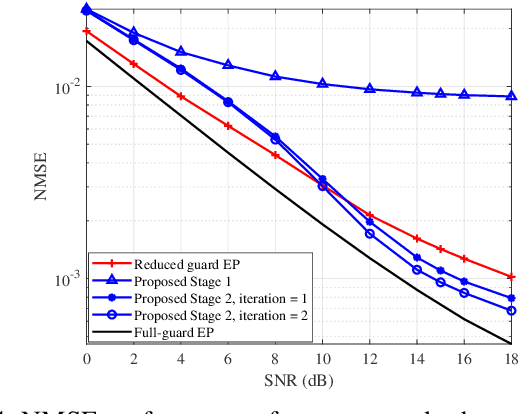

Abstract:Orthogonal time frequency space modulation (OTFS) is currently one of the most robust modulation techniques for high Doppler channels. However, to reap the benefits of OTFS, an accurate channel estimation is crucial. To this mean, the widely used embedded pilot structures use twice the channel length size as a delay guard to avoid interference between the pilot and data symbols. Hence, incurring a large spectral efficiency loss, especially in wideband systems where the channel length is large. To reduce the pilot overhead, we propose a novel split pilot structure with two impulse pilots. With two pilots, we can use one to cancel the other, thus, capable of removing the pilot interference over data. To remove the data interference from the pilot, we also propose an iterative joint channel estimation and detection technique tailored to the proposed split pilot structure. With the interference caused by the delay spread solved, we reduce the number of delay guards in our system by half, significantly improving the spectral efficiency. To corroborate our claims, we numerically demonstrate that our proposed method can achieve performance levels comparable to that of the full-guard method while using only half the delay guard. Additionally, we show that our proposed iterative channel estimating technique has a fast convergence speed, requiring only two iterations.
Synchronization for Multiuser Uplink OTFS
Oct 14, 2024



Abstract:In this paper, we propose time and frequency synchronization techniques for the uplink of multiuser OTFS (MU-OTFS) in high-mobility scenarios. We introduce a spectrally efficient and practical pilot pattern where each user utilizes a pilot with a cyclic prefix (PCP) within a shared pilot region on the delay-Doppler plane. At the receiver, a bank of filters is deployed to separate the users' signals and accurately estimate their timing offsets (TOs) and carrier frequency offsets (CFOs). Our technique employs a threshold-based approach that provides precise TO estimates. Our proposed CFO estimation technique reduces the multi-dimensional maximum likelihood (ML) search problem into multiple one-dimensional search problems. Furthermore, we apply the Chebyshev polynomials of the first kind basis expansion model (CPF-BEM) to effectively handle the time-variations of the channel in obtaining the CFO estimates for all the users. Finally, we numerically investigate the error performance of our proposed synchronization technique in high mobility scenarios for the MU-OTFS uplink. Our simulation results confirm the efficacy of the proposed technique in estimating the TOs and CFOs which also leads to an improved channel estimation performance.
Truncated Turbo Equalizer with SIC for OTFS
May 24, 2023
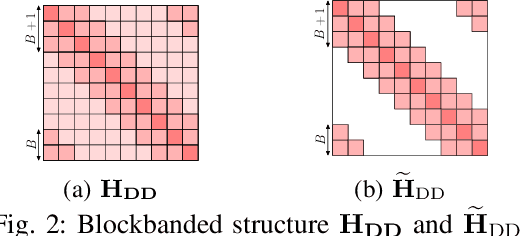
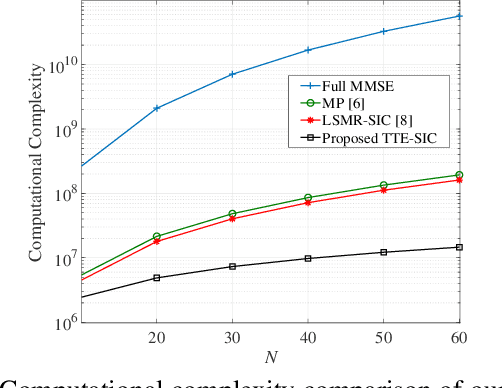
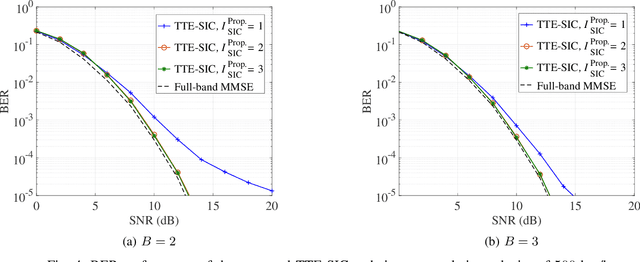
Abstract:Orthogonal time frequency space (OTFS) is a promising candidate waveform for the next generation wireless communication systems. OTFS places data in the delay-Doppler (DD) domain, which simplifies channel estimation in highmobility scenarios. However, due to the 2-D convolution effect of the time-varying channel in the DD domain, equalization is still a challenge for OTFS. Existing equalizers for OTFS are either highly complex or they do not consider intercarrier interference present in high-mobility scenarios. Hence, in this paper, we propose a novel two-stage detection technique for coded OTFS systems. Our proposed detector brings orders of magnitude computational complexity reduction compared to existing methods. At the first stage, it truncates the channel by considering only the significant coefficients along the Doppler dimension and performs turbo equalization. To reduce the computational load of the turbo equalizer, our proposed method deploys the modified LSQR (mLSQR) algorithm. At the second stage, with only two successive interference cancellation (SIC) iterations, our proposed detector removes the residual interference caused by channel truncation. To evaluate the performance of our proposed truncated turbo equalizer with SIC (TTE-SIC), we set the minimum mean squared error (MMSE) equalizer without channel truncation as a benchmark. Our simulation results show that the proposed TTE-SIC technique achieves about the same bit error rate (BER) performance as the benchmark.
Practical Synchronization for OTFS
Jan 24, 2023Abstract:In the existing literature on joint timing and frequency synchronization of orthogonal time frequency space modulation (OTFS), practically infeasible impulse pilot with large peak-to-average power ratio (PAPR) is deployed. Hence, in this paper, we propose a timing offset (TO) and carrier frequency offset (CFO) estimation for OTFS over a linear time-varying (LTV) channel, using a low PAPR pilot structure. The proposed technique utilizes the recently proposed practically feasible pilot structure with a cyclic prefix (PCP). We exploit the periodic properties of PCP in both delay and time domains to find the starting point of each OTFS block. Furthermore, we propose a two-stage CFO estimation technique with over an order of magnitude higher estimation accuracy than the existing estimator using the impulse pilot. In the first stage, a coarse CFO estimate is obtained which is refined in the second stage, through our proposed maximum likelihood (ML) based approach. The proposed ML-based approach deploys the generalized complex exponential basis expansion model (GCE-BEM) to capture the time variations of the channel, absorb them into the pilot and provide an accurate CFO estimate. Since our proposed synchronization technique utilizes the same pilot deployed for channel estimation, it does not require any additional overhead. Finally, we evaluate the performance of our proposed synchronization technique through simulations. We also compare and show the superior performance of our proposed technique to the only other existing joint TO and CFO estimation method in OTFS literature.
 Add to Chrome
Add to Chrome Add to Firefox
Add to Firefox Add to Edge
Add to Edge